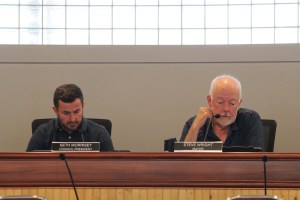Options outlined for renovation of former Cannon Beach Elementary School
Published 2:00 pm Wednesday, March 5, 2025

- An elementary school in Cannon Beach closed because of tsunami concerns.
CANNON BEACH — Councilors and city staff on Tuesday examined four options for a renovation of the Cannon Beach Elementary School building in a discussion dominated by inquiries about how to involve the community in the decision-making process.
Trending
The path forward for the project has remained unclear after voters rejected bond financing that would have authorized $7.8 million to complete the $12.4 million plan to convert the former school property into a cultural and community center.
Voters rejected bond financing for the project in an advisory vote that was deemed binding in order to settle a lawsuit brought by critics of city infrastructure spending.
The elementary school closed in 2013 due to tsunami concerns.
Trending
The two buildings on the property are in poor condition and are unsuitable to enter until they are brought up to code, which in itself would cost around $9 million for both structures.
The four options and their estimated costs, presented to the city council by Ben Carlson of Bremik Construction, are:
• Demolish the two existing buildings and construct one new structure, at a cost of around $5.6 million.
• Demolish the existing classroom building and renovate the existing gym building, with a price tag between $5.4 million and $6.2 million.
• Demolish the gym building and renovate the classroom building, at a cost between $5.1 million and $6 million.
• Renovate the gym building and leave the classroom building as is, with a cost between $6.4 million and $7.6 million.
The cost estimates are based on current financing projections, and do not take inflation into account.
Several people spoke during public comment to advocate saving the 7,000-square-foot gymnasium, emphasizing its usefulness as a space for various sports, performances and events. Others pointed to the classrooms as a potential space for group meetings and for teaching, especially about subjects related to nature and its location on the site of a former Clatsop-Nehalem village.
“I feel that the classrooms would be well-used,” said Richard Basch of the Clatsop-Nehalem Confederated Tribes. “And the gym is such a good place for the community to be able to do sports activities, to have bagpipes come in and play, to have pickleball tournaments.”
Councilor Lisa Kerr said that bringing both buildings up to code, which she dubbed a “patch-and-paint” project, is not only expensive, but also fails to promise very usable buildings.
“I know that some people want to say both,” she said. “I got that … I heard the gym was people’s primary desire to save if you’re going to save something, and you can do a lot of things with an open space, right?”
Of primary concern is how to fund any of the proposed renovations. Funding the renovations with money from the transient lodging tax would necessitate a tourism-related facility, while going without tourism dollars could lead to a fairly significant property tax increase for residents.
City attorney Ashley Driscoll referenced House Bill 3556, which has been introduced into the state legislative session and proposes an expansion of how communities can use the transient lodging tax , allowing cities to fund community recreation facilities with the tax.
“I try not to get my hopes up too much regarding these TLT bills, because I always get my heart broken when they don’t move anywhere,” she said. “But I’ve been told that this one has legs.”
Mayor Barb Knop said that the Oregon Coastal Caucus has promoted the bill. But the legislative session ends in June, and councilors determined that three months was just too long to wait to glean community feedback.
Councilors proposed a survey, though they acknowledged it would be a complicated one given the nuances of the project’s financing and proposed uses. In addition, city surveys historically have not drawn much participation.
“It almost seems like it would take a professional to design a survey that would cover all the different aspects, including the funding,” said Kerr. “And then again, that then costs money.”
Jennifer Beattie, of the Portland-based design firm CIDA, which has been working with the city and Bremik Construction on the project, told the council that she had some people in mind to create the survey.
“I’ll double-check that they’ll do it, and then define a scope,” she said, adding that would give councilors an idea of what such a survey would cost.









